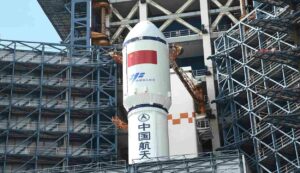China is expected to launch a new manned mission into space this week
BEIJING: As Beijing moves closer to its objective of landing humans on the Moon, a new crewed mission is anticipated to be launched into space this week. The Shenzhou-20 mission, which will transport three astronauts to China’s self-built Tiangong space station for a probable six-month stay, will launch from the Jiuquan Satellite Launch Center in northwest China.

To further the space program’s lofty goals of landing humans on the moon by 2030 and ultimately constructing a lunar outpost, the crew will conduct tests.
The Shenzhou spacecraft and its Long March-2F carrier rocket were moved to a launch location at the isolated desert facility, according to the nation’s space agency, which said last week that the launch will take place “at an appropriate time in the near future.”
The streamlined white rocket was saluting China’s space program with red-and-gold banners as it pointed upwards from a blue podium adorned with national flags, according to photos released by the official news agency Xinhua.
“The equipment and infrastructure at the launch site are currently in excellent shape. The China Manned Space Agency (CMSA) said that the joint testing and functional inspections will go according to schedule.
The names of the Shenzhou-20 astronauts and the tasks they will do have not yet been disclosed by authorities.
A staffer at the nation’s astronaut training facility, Zhou Wenxing, said that the crew was “in good condition, precise in operation, and smooth in coordination” in a report released by state broadcaster CCTV on Sunday, April 20.
“SPACE DREAM”
Shenzhou-19, China’s final crewed mission, commenced last October and is scheduled to conclude on April 29.
Cai Xuzhe, 48, a veteran air force pilot who previously flew on the Tiangong space station on the Shenzhou-14 mission in 2022, is in charge of it.
Wang Haoze, a 35-year-old aerospace engineer and the third Chinese woman to participate in a crewed mission, is also on board.
The third member is Song Lingdong, a 34-year-old guy.
According to reports at the time of launch, the Shenzhou-19 crew have been testing “bricks” created from components that mimic lunar soil to investigate how severe radiation, gravity, temperature, and other circumstances affect them.
China has advanced its aspirations to realize its “space dream” under President Xi Jinping.
In addition to landing robotic rovers on Mars and the Moon, its space program was the third to launch people into orbit.
Tiangong, the space station manned by three-person crews that alternate every six months, is the crown jewel.
According to Beijing, a crewed trip to the Moon is on schedule for 2030.
The nation has invested billions of dollars in creating a cutting-edge space program comparable to those of the US and Europe in recent decades.
It became the first spaceship to land its Chang’e-4 probe on the Moon’s far side in 2019. It successfully landed a tiny robot on Mars in 2021.
Tiangong is expected to be in operation for around ten years. Its fundamental module, Tianhe, was introduced in 2021.